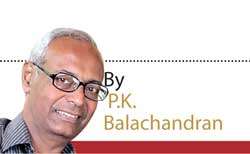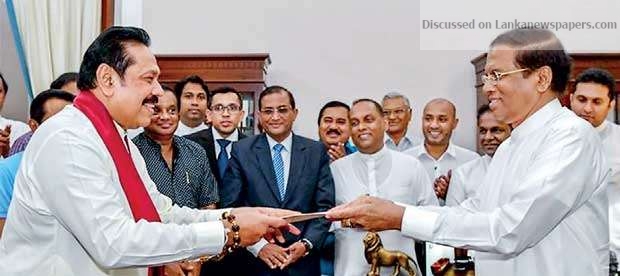Pros and cons of Crossovers
- Crossovers from one party to another have been a constant feature in Sri Lanka in recent years
- Many feel that Sri Lanka should have an anti-defection law to prevent political horse trading
- Many feel that Sri Lanka should have an anti-defection law to prevent political horse trading
- People feel that Rajapaksa would provide a better Government
 Colombo, November 5: Crossovers from one party to another in Parliament have been a constant feature in Sri Lanka in recent years. They were endemic in India till the Constitution was amended by the 52nd Amendment in 1985 and by the 91st Amendment in 2003 to make defections difficult.
Colombo, November 5: Crossovers from one party to another in Parliament have been a constant feature in Sri Lanka in recent years. They were endemic in India till the Constitution was amended by the 52nd Amendment in 1985 and by the 91st Amendment in 2003 to make defections difficult.
There are mixed feelings among political scientists about crossovers. At times, they have helped form stable Governments, and at other times they have brought down Governments creating instability.
In 2001, a severe political crisis-afflicted the Sri Lankan Parliament, which had been elected only in the previous year.
Numerous MPs from the ruling Peoples’ Alliance (PA) quit the group and joined the Opposition led by Ranil Wickremesinghe of the United National Party (UNP).
In June 2001, 11 members of the Sri Lanka Muslim Congress (SLMC) and National Unity Alliance (NUA) had quit the PA, peeved by the sacking of Minister Rauff Hakeem by President Chandrika Kumaratunga.
 On October 10, 2001, with the political crisis in the PA deepening, eight Sri Lanka Freedom Party (SLFP) MPs: S.B. Dissanayake, Wijepala Mendis, Ananda Moonesinghe, Bandula Nanayakkara, G.L. Peiris, Ediriweera Premaratne, Jayasundara Wijekoon and Mahinda Wijesekara and four MPs of the Ceylon Workers’ Congress (CWC) crossed over to the Opposition.
On October 10, 2001, with the political crisis in the PA deepening, eight Sri Lanka Freedom Party (SLFP) MPs: S.B. Dissanayake, Wijepala Mendis, Ananda Moonesinghe, Bandula Nanayakkara, G.L. Peiris, Ediriweera Premaratne, Jayasundara Wijekoon and Mahinda Wijesekara and four MPs of the Ceylon Workers’ Congress (CWC) crossed over to the Opposition.
This created a fear in the government that it could lose a vote of no confidence. Parliament was dissolved and elections to Parliament were held in December 2001. The instability in 2000 and 2001 was due to the bad way in which the war against Tamil Tigers was going, and the poor condition of the Sri Lankan economy at that time.
The Parliamentary elections held in 2004 did not give a decisive mandate. The new United Peoples’ Freedom Alliance (UPFA) led by President Chandrika Kumaratunga was able to get only 105 seats in a House of 225.
Being the single largest party, the UPFA formed a “Minority” Government. But post-election defections from the Opposition front gave the Government then headed by Prime Minister Mahinda Rajapaksa, 129 supporters in Parliament, which enabled Rajapaksa to rule comfortably.
However, the defections were engineered by largesse handed out in the form of Ministerial Posts and other benefits, which made the process of political accretion unsavoury.
Parliament had become a marketplace for buying MPs.
In the 2010 elections to Parliament, the UPFA under President Mahinda Rajapaksa won 144 seats. Even though the Rajapaksa Government was blessed with an overwhelming majority, it encouraged crossovers from the Opposition with the distribution of Ministerial posts to give Rajapaksa an aura of great power and invincibility.
In the elections held in August 2015, the United National Front for Good Governance (UNFGG) led by Ranil Wickremesinghe, won 106 seats and the UPFA, 95.
However, though short of the required 113 supporters, the UNF was able to form a Government by getting various parties to support it.
The apple cart was upset when on October 26, 2018, President Maithripala Sirisena sacked Prime Minister Wickremesinghe and his cabinet and appointed Mahinda Rajapaksa as PM, even though the latter had only 95 MPs backing him.
To get the required 113 seats, Rajapaksa set about catching MPs with offers of Ministerial posts and allegedly with large amounts also.
President Sirisena prorogued Parliament from October 27 to November 15 allegedly to give Rajapaksa enough time to acquire a majority by engineering defections from the UNFGG.
Whether Rajapaksa would succeed in getting a majority or not would be known when his Vote on Account or the No-Confident Motion is put to vote after Parliament is convened on November 14.
Vocal sections of society, comprising the educated middle class mostly, are critical of the defections and the way they are engineered. But the hoi polloi appear to be keen on getting a strong, performing Government which will deliver the goods and look after the downtrodden.
They feel that Rajapaksa would provide such a Government in contrast to Wickremesinghe.
Therefore, there appears to be a difference between the way the elite and the middle class see defections.
Many feel that Sri Lanka should have an anti-defection law to prevent political horse trading.
But as seen earlier, defections have, in some situations, helped form stable governments and in some others destroyed governments and forced fresh and expensive elections on the people.
However, what is truly despicable is the purchasing of MPs with money and other inducements with no connection whatsoever with policy or ideological issues.
It is the purchase of MPs and their willingness to sell themselves to the highest bidder, which have made defections ‘vulgar.’
About 40 countries have anti-defection laws. India has been having one since 1985. Between 1985 and 2004, 113 Indian legislators in Parliament and State Assemblies were unseated for defecting from one party to another.
Under Indian law, a Legislator will be unseated if he voluntarily gives up his membership of the political party he represents; if he votes or abstains from voting in the House contrary to the direction issued by his political party or without obtaining prior permission.
As per the 1985 Act, a ‘defection’ by one-third of the elected members of a political party was authorized and declared legitimate. Later, in 2003, two-thirds of the MPs of a party would have to defect for the defection to be recognized as legitimate and condoned. The 2003 condition made defection more difficult than it was under the 1985 law.
However, there will be no disqualification if an entire political party merges with another; if a new political party is formed by some of the elected members of a party; if he or she or other members of the party have not accepted the merger between the two parties and opted to function as a separate group from the time of such a merger.
Under the 1985 Act, courts were barred from entertaining petitions against disqualification. Decisions on expulsion and unseating were left to party leaders and the Speaker or Chairman of the legislature.
But this was subsequently struck down by the Supreme Court. Currently, the anti-defection law comes under Judicial Review.
Critics of the anti-defection law say that it prevents free speech and allows party heads to dictate terms to members of their parties in the legislature.
Bound hand and foot by their party leaders, legislators are unable to correct wrong policies and prevent political disasters.
For instance, in the Maldives under Abdulla Yameen’s Presidency, 12 MPs of the ruling Progressive Party of the Maldives (PPM) were unseated in 2017 for planning to join the Opposition in voting for the ouster of the controversial Speaker Abdullah Maseeh Mohamed.
It was only after Yameen’s defeat in the September 23 Presidential election, that the Supreme Court reinstated them.
Given the unsavoury role of the anti-defection rules in the Maldivian Opposition’s struggle against Yameen’s autocracy, the anti-PPM parties, which now have a majority in Parliament, have repealed the anti-defection law.
New Zealand has given up its anti-defection law. The US allows defections on the grounds that the law violates individual freedom.
According to an Indian Supreme Court ruling in 1992, the anti-defection law does not violate any rights or freedoms, or the basic structure of Parliamentary democracy.
Since the final decision on punishing defectors is subject to appeal in the High Courts and the Supreme Court, many defectors go to the courts and manage to hold on to their seats.
Therefore, anti-defection laws have their upside and downside. It is also noted by scholars that while older democracies like those in the West do not feel the need to have an anti-defection law and are quite comfortable with dissenters, the younger democracies, which fear political instability, show greater eagerness to enact anti-crossover laws.

